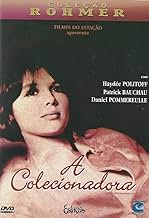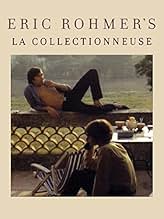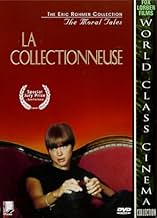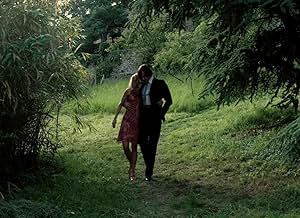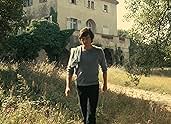A womanizing art dealer and a painter find the serenity of their Riviera vacation disturbed by a third guest, a vivacious bohemian woman known for her long list of male conquests.A womanizing art dealer and a painter find the serenity of their Riviera vacation disturbed by a third guest, a vivacious bohemian woman known for her long list of male conquests.A womanizing art dealer and a painter find the serenity of their Riviera vacation disturbed by a third guest, a vivacious bohemian woman known for her long list of male conquests.
- Awards
- 2 wins & 1 nomination total
Mijanou Bardot
- Carole
- (as Mijanou)
Eugene Archer
- Sam
- (uncredited)
Brian Belshaw
- Haydée's boyfriend
- (uncredited)
Pierre-Richard Bré
- Homme dans l'auto
- (uncredited)
Donald Cammell
- Garçon à St-Tropez
- (uncredited)
Alfred de Graff
- Touriste perdu
- (uncredited)
Featured reviews
A young man (Patrick Bauchau) parts with his fiancée to vacation in the south of France, where he plans to catch up with an old friend and spend his time in solitude. His holiday idyll is perturbed by the presence of a young woman (Haydée Politoff), who he says is not his type, but spends an awful lot of his time thinking about. She's sexually free and while in search of what she's looking for in life, sleeps with various men, a fact that gets under his skin.
The film is appealing aesthetically because through various small observational details in the surroundings and in the introspective silences he allows in, Éric Rohmer transports us to this place and its feeling. Politoff is also appealing to say the least, and her character has such an innocent simplicity about her that she's charming to watch. These are the things that made the film for me.
What I disliked about it was the protagonist, who provides the narration and the point of view of the film. While Rohmer is making a point about male insecurity and this guy's issues (as well as the other guy there, who's also an idiot), I have to say, he's so cold and judgmental that he's not likeable. I would have loved a version of this film that was made from Haydée's perspective. To its credit, through dialogue she is allowed to express her opinions, e.g. That he should mind his own business, and her boredom as he prattles on with his tedious pseudo-intellectualism. The art dealer also provides quite a takedown of the young man's not working and general laziness. He seems empty as a person and I suppose we're meant to recognize that and compare it to Haydée, who presumably goes off to Italy at the end and gets more enjoyment out of life. It's just unfortunate that the film, through its title and its narration, seems to share some of the viewpoint of the young man.
Overall, however, I liked this film both times I've watched it, and thought it was wisely kept at just 83 minutes. It makes me feel as though I was on holiday, and the images of Haydée Politoff are indelible.
The film is appealing aesthetically because through various small observational details in the surroundings and in the introspective silences he allows in, Éric Rohmer transports us to this place and its feeling. Politoff is also appealing to say the least, and her character has such an innocent simplicity about her that she's charming to watch. These are the things that made the film for me.
What I disliked about it was the protagonist, who provides the narration and the point of view of the film. While Rohmer is making a point about male insecurity and this guy's issues (as well as the other guy there, who's also an idiot), I have to say, he's so cold and judgmental that he's not likeable. I would have loved a version of this film that was made from Haydée's perspective. To its credit, through dialogue she is allowed to express her opinions, e.g. That he should mind his own business, and her boredom as he prattles on with his tedious pseudo-intellectualism. The art dealer also provides quite a takedown of the young man's not working and general laziness. He seems empty as a person and I suppose we're meant to recognize that and compare it to Haydée, who presumably goes off to Italy at the end and gets more enjoyment out of life. It's just unfortunate that the film, through its title and its narration, seems to share some of the viewpoint of the young man.
Overall, however, I liked this film both times I've watched it, and thought it was wisely kept at just 83 minutes. It makes me feel as though I was on holiday, and the images of Haydée Politoff are indelible.
Two tired cliches are that sex destroys friendships and that men and women can never really be friends and no-one chronicled these two sayings better than Eric Rohmer who made it his life's work to explore the psychological battles that we call courtship. In doing so he became, perhaps, the cinema's greatest director of women. Let's forget for a moment that he divided his films into series, (Six Moral Tales, for example, of which "La Collectionneuse" is one), and concentrate on the film at hand.
"La Collectionneuse" is very simple and very straightforward. Two male friends spend a summer sharing a villa in the south of France. There is another occupant, a slightly younger woman who sleeps around and it is she the men christen the collector since she 'collects' men wherever she goes. They, of course, consider themselves moral but they are also intellectuals and perhaps womanisers, too. They want to collect the girl; they want the girl to collect them.
Like all of Rohmer's best work this is a film of talk rather than action. Rohmer doesn't film love scenes or sex scenes; once his male and female characters enter the bedroom he loses interest. It's the chase and not the catch he cares about and whether men and women really can be friends as well as lovers. He takes his subjects seriously but he also likes to have fun at their expense and like so many of his films "La Collectionneuse" will have you chuckling if not exactly laughing out loud.
In his later films it was usually the women who took the lead but here it is Adrien, (a superb Patrick Bauchau), who acts as our narrator, guiding us through the moral maze but then all three players are excellent. This may be a minor Rohmer film but minor only in the way a short story is considered minor when compared to a novel. Personally I think "La Collectionneuse" is a Rohmer crying out for your collection.
"La Collectionneuse" is very simple and very straightforward. Two male friends spend a summer sharing a villa in the south of France. There is another occupant, a slightly younger woman who sleeps around and it is she the men christen the collector since she 'collects' men wherever she goes. They, of course, consider themselves moral but they are also intellectuals and perhaps womanisers, too. They want to collect the girl; they want the girl to collect them.
Like all of Rohmer's best work this is a film of talk rather than action. Rohmer doesn't film love scenes or sex scenes; once his male and female characters enter the bedroom he loses interest. It's the chase and not the catch he cares about and whether men and women really can be friends as well as lovers. He takes his subjects seriously but he also likes to have fun at their expense and like so many of his films "La Collectionneuse" will have you chuckling if not exactly laughing out loud.
In his later films it was usually the women who took the lead but here it is Adrien, (a superb Patrick Bauchau), who acts as our narrator, guiding us through the moral maze but then all three players are excellent. This may be a minor Rohmer film but minor only in the way a short story is considered minor when compared to a novel. Personally I think "La Collectionneuse" is a Rohmer crying out for your collection.
10totius
It's hard to explain what is the Rohmer's cinema. In his movies you can't find heroes, incredible adventures or great action sequences. Everything happens inside the mind of the characters, and the most important aspect is the psychology of them.
La Collectioneuse is simply the masterpiece of Rohmer.
The plot is very simple: two boys and one girl in their friend's house in St.Tropez. That's all. There are not incredible events that happen, they simply LIVE there. It's an typical situation of Rohmer who likes to study the evolution of love triangles, in different situations. The explanation of the development steps, made by the usual interior voice of the main character (Adrien), it's incredibly accurate and likely. It's fantastic that sometimes Adrien's thoughts look at first to be absurd, but even in this case if we reflect a bit to that we can realize that it's true, that really in similar cases we have non-sense thoughts like those. In this way, Rohmer is unique: the psycho-evolution of the characters is incredibly real. Dialogs, internal and not, are superb and the directing essential.
Rohmer shows us how it's possible to make a masterpiece with a ridiculous budget, and how an intellectual movie can be also enjoyable and not so heavy.
The vote, of course, can't be different by 10 out of 10.
La Collectioneuse is simply the masterpiece of Rohmer.
The plot is very simple: two boys and one girl in their friend's house in St.Tropez. That's all. There are not incredible events that happen, they simply LIVE there. It's an typical situation of Rohmer who likes to study the evolution of love triangles, in different situations. The explanation of the development steps, made by the usual interior voice of the main character (Adrien), it's incredibly accurate and likely. It's fantastic that sometimes Adrien's thoughts look at first to be absurd, but even in this case if we reflect a bit to that we can realize that it's true, that really in similar cases we have non-sense thoughts like those. In this way, Rohmer is unique: the psycho-evolution of the characters is incredibly real. Dialogs, internal and not, are superb and the directing essential.
Rohmer shows us how it's possible to make a masterpiece with a ridiculous budget, and how an intellectual movie can be also enjoyable and not so heavy.
The vote, of course, can't be different by 10 out of 10.
The arrogant and pretentious intellectual art dealer Adrien (Patrick Bauchau) invites his girlfriend to travel with him to the coast to spend one month vacation with his close friend and painter Daniel (Daniel Pommereulle) in the house of their Randolphe. Adrien expects to do nothing but read and rest in the house and meet a possible investor in an art gallery that he dreams on having; however she prefers to travel to London. When he arrives, he discovers that the sexy and promiscuous pleasure-seeking Haydee (Haydée Politoff) that had one nightstand with Randolphe is sharing the house with Daniel. Along the days, Adrien becomes obsessed in a sick game of humiliating Haydee and imaging that she is trying to seduce him; however, his lust for her increases but his moral rationalization of their possible relationship keeps them apart.
"La Collectionneuse" is an erotic tale of arrogance, false value judgment and pretentious intellectuality of a false moralist. The witty and cynical screenplay uses excessive narrative in off of the unlikable lead character Adrien that is despicable as well as his friend Daniel. Actually, the only likable character is the libertine Haydee that accepts passively the cruel comments and treatment of Adrien and Daniel. Eric Rohmer uses the successful idea of a triangle of love with two men and a woman of "Jules et Jim" in a different and monotonous approach. My vote is six.
Title (Brazil): "A Colecionadora" ("The Female Collector")
"La Collectionneuse" is an erotic tale of arrogance, false value judgment and pretentious intellectuality of a false moralist. The witty and cynical screenplay uses excessive narrative in off of the unlikable lead character Adrien that is despicable as well as his friend Daniel. Actually, the only likable character is the libertine Haydee that accepts passively the cruel comments and treatment of Adrien and Daniel. Eric Rohmer uses the successful idea of a triangle of love with two men and a woman of "Jules et Jim" in a different and monotonous approach. My vote is six.
Title (Brazil): "A Colecionadora" ("The Female Collector")
La Collectionneuse is a fine example how consistent Eric Rohmer was throughout his Moral Tales series. The story isn't important here, its the intensity of each scene and the tension among the characters till the last scene. Subtle jump cuts in the storyline can make you pause & arrive at your own hypotheses about how the characters are feeling in the following scenes. This is a visual treat - whether its the sights & sounds of the reviera house where most of the movie takes place, or the shots of beach or Haydee Politoff's delicious lips. You never begin to hate or love any character at any point - but they stay on your mind long after the movie is over. The characters, adrian, haydee & daniel exude human rawness - none are perfect or simplistic. As a viewer, I could not take anyone's side. They all seek power in their own ways, while exposing their sensitivies equally. Its a curious caricature of the complexities around love and life. Rohmer uses symbols like antiques to express how the relationships are built and broken. I could watch it again & again. A delightful Rohmer classic - its poetic, with a pacing that works as a meditation of sorts.
Did you know
- TriviaÉric Rohmer's first color film.
- ConnectionsFeatured in Uuden aallon jäljillä (2009)
Details
- Release date
- Country of origin
- Official site
- Languages
- Also known as
- Kolekcionarka
- Filming locations
- Côte d'Azur, France(coastal line and landscapes)
- Production companies
- See more company credits at IMDbPro
Box office
- Gross worldwide
- $7,077
- Runtime
- 1h 26m(86 min)
- Sound mix
- Aspect ratio
- 1.37 : 1
Contribute to this page
Suggest an edit or add missing content

![Watch Bande-annonce [OV]](https://m.media-amazon.com/images/M/MV5BMjA2ZGRjY2QtNmMzMy00MjE3LWI1YzUtZTZiZDQ5YzY0YWIxXkEyXkFqcGdeQXRyYW5zY29kZS13b3JrZmxvdw@@._V1_QL75_UX500_CR0)
